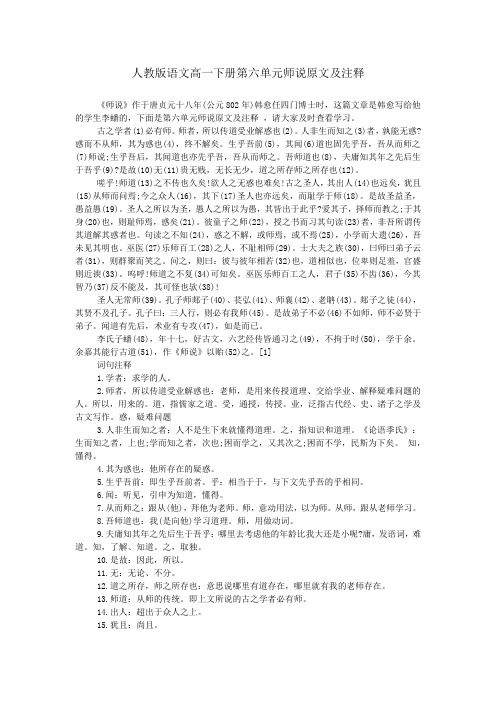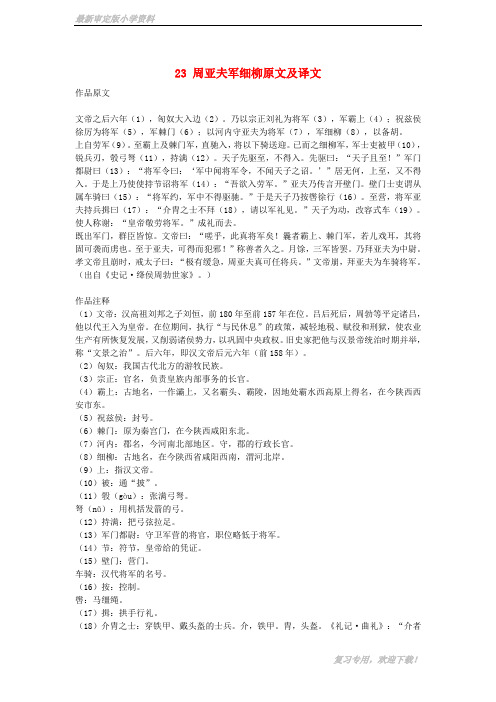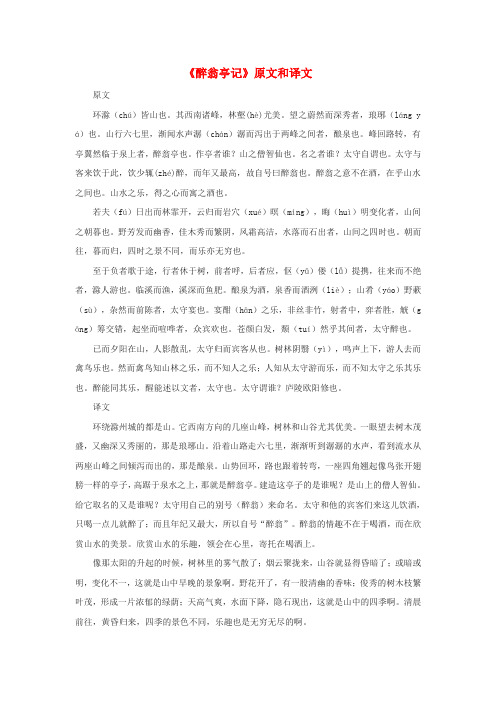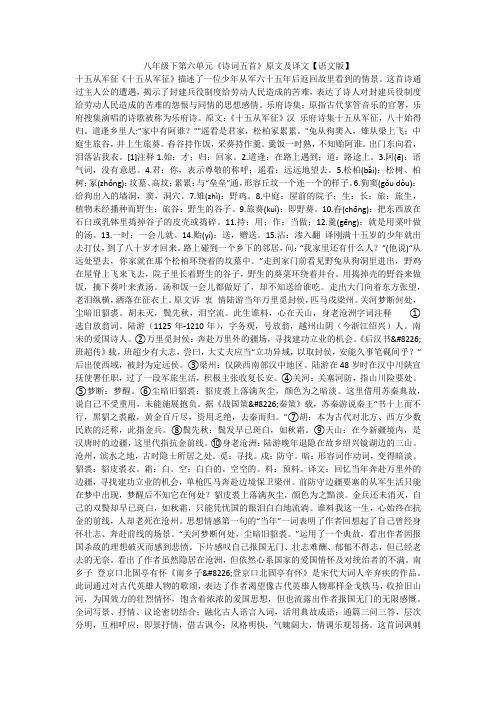第六单元原文及参考译文
人教版英语四年级上册第六单元课文原文

人教版英语四年级上册第六单元课文原文全文共10篇示例,供读者参考篇1Hi guys! Today I'm gonna tell you about the sixth unit of our English textbook. It's all about animals and their habitats. So let's dive in and learn all about it!First, we learned about the desert. The desert is a dry and hot place with very little water. It's home to animals like camels, snakes, and scorpions. They have special adaptations to help them survive in the harsh desert environment. Like camels have humps to store water, and snakes have scales to protect themselves from the heat.Next, we talked about the forest. The forest is a green and lush place with lots of trees and plants. It's home to animals like bears, deer, and owls. They have different adaptations to help them survive in the forest. Like bears have thick fur to keep warm, and owls have sharp claws to catch their prey.After that, we learned about the ocean. The ocean is a vast and deep place with lots of water. It's home to animals like dolphins, sharks, and jellyfish. They have special adaptations tohelp them survive in the ocean. Like dolphins have fins to swim fast, and sharks have sharp teeth to catch their food.Finally, we talked about the Arctic. The Arctic is a cold and icy place with snow and ice everywhere. It's home to animals like polar bears, seals, and penguins. They have special adaptations to help them survive in the freezing cold. Like polar bears have thick fur and a layer of blubber to stay warm, and penguins have waterproof feathers to keep dry.So that's all about the sixth unit of our English textbook. I hope you guys learned a lot about animals and their habitats. Stay curious and keep exploring the world around you! Bye bye!篇2Hello everyone! Today I'm going to tell you about the text in Unit 6 of our English textbook for Grade 4.The title of the text is "What’s the weather like in spring?"In spring, the weather gets warmer and the days get longer. It's a great time to go outside and play with our friends. We can see flowers blooming and birds singing.Sometimes, it rains in spring. When it rains, we can wear our raincoats and boots and jump in puddles. It's so much fun!But not every day is rainy. Some days are sunny and bright. We can wear our sunglasses and hats to protect ourselves from the sun. We can have a picnic in the park or ride our bikes around the neighborhood.In spring, the trees start to grow new leaves and the grass turns green again. It's a beautiful time of year!I hope you enjoyed my summary of the text in Unit 6. Let's keep practicing our English and have fun learning together! Thank you for listening!篇3Once upon a time, there was a little girl named Lucy. Lucy loved animals so much that she decided to visit the zoo with her family.When they arrived at the zoo, Lucy was super excited to see all the different animals. She saw lions, tigers, elephants, and even monkeys swinging from tree to tree.Lucy and her family walked around the zoo, stopping at each exhibit to learn more about the animals. They read the signs and listened to the zookeeper talk about each animal.Lucy’s favorite animals were the pandas. She thought they were so cute with their black and white fur. She even got to see a baby panda playing with its mother. It was the cutest thing she had ever seen!After spending the whole day at the zoo, Lucy and her family were tired but happy. They had learned so much about the animals and had a great time together.As they left the zoo, Lucy turned to her mom and said, “I love animals so much! I want to come back to the zoo every day!”And from that day on, Lucy knew that she wanted to work with animals when she grew up. She wanted to help take care of them and make sure they were happy and healthy.And that’s how Lucy’s love for animals began at the zoo. She never forgot that day and always treasured the memories she made with her family.篇4Title: My Day at the ZooHi everyone! Today I want to tell you about my trip to the zoo. It was super fun!First, we saw the lions. They were so big and had fluffy manes. I heard them roar and it was really loud. The lioness was playing with her cubs and they were so cute!Next, we went to see the elephants. They were huge! I saw them eating lots of hay and throwing dirt on their backs. It looked like they were having a spa day!After that, we visited the giraffes. They had long necks and spots all over their bodies. I saw them eating leaves from the trees and they looked so graceful.We also saw the monkeys swinging from tree to tree. They were so funny and made all kinds of noises. I laughed so hard watching them play.Finally, we went to the penguin exhibit. The penguins were waddling around and swimming in the water. They were so cute and fluffy!I had a great time at the zoo. I learned a lot about different animals and had so much fun with my friends. I can't wait to go back again!That's all for now. Thanks for listening! Bye bye!篇5Hello everyone! Today I'm going to tell you a story from our English textbook. It's from Unit 6 of Grade 4, called "What are you doing for vacation?"In this unit, we learn about different activities that people do during their vacation. We learn how to ask and answer questions about vacation plans. It's so fun!In the story, Lily asks her friends what they are doing for vacation. Amy is going to the beach with her family. She will swim in the sea, build sandcastles, and collect seashells. Tom is going camping in the mountains. He will hike, fish in the river, and sleep in a tent. Lily is going to visit her grandparents in the countryside. They will pick fruits, feed animals, and play fun games together.I think vacations are so exciting! I want to go to the beach too, like Amy. I love playing in the sand and splashing in the waves. But camping in the mountains sounds cool too. I would love to go fishing and sleep under the stars. And visiting grandparents in the countryside sounds fun as well. I can imagine all the delicious food and games we would play.So, what are you doing for vacation? Are you going to the beach, camping in the mountains, or visiting your grandparents?Let me know in the comments below! Let's share our vacation plans and have a great time together.That's the end of our story from Unit 6. I hope you enjoyed it as much as I did. See you next time! Bye-bye!篇6Once upon a time, there was a little boy named Timmy. He lived in a small town with his family and went to a local elementary school. One day, Timmy's teacher told the class that they were going to learn a new unit in English class.The unit was all about different countries and their cultures. Timmy was super excited because he loved learning about new things. The first country they learned about was Japan. Timmy learned all about the beautiful cherry blossoms, delicious sushi, and traditional kimonos.The next country they learned about was India. Timmy was amazed by the vibrant colors of the saris, spicy food like curry, and the famous Taj Mahal. He couldn't believe how diverse and interesting the world was.As they continued through the unit, Timmy learned about other countries like Egypt, Mexico, and Australia. He wasfascinated by the pyramids of Egypt, the ancient Mayan temples in Mexico, and the unique animals in Australia like kangaroos and koalas.By the end of the unit, Timmy had a newfound appreciation for different cultures and traditions around the world. He realized that even though we may be different, we are all connected in some way.Timmy couldn't wait to travel the world one day and experience all the amazing things he had learned about. He was grateful for the opportunity to learn about different countries in his English class and couldn't wait for the next adventure in his learning journey.篇7One day, Miss White asked us to write a composition about our favorite animals. I was so excited because I love animals very much!I started my composition by writing, "My favorite animal is a panda. It is black and white and very cute. Pandas eat bamboo and can climb trees very well. They are also very good swimmers.I love pandas because they are so playful and funny."Next, I wrote about my friend Lily's favorite animal. She loves dolphins. I wrote, "Lily's favorite animal is a dolphin. Dolphins are very smart and can do tricks like jumping out of the water and spinning in the air. Lily loves dolphins because they are so friendly and playful."After that, I wrote about Tom's favorite animal. He likes tigers. I wrote, "Tom's favorite animal is a tiger. Tigers are big and strong and have orange fur with black stripes. They are very powerful hunters and can run very fast. Tom thinks tigers are so cool because they are brave and fierce."Lastly, I wrote about Sarah's favorite animal. She likes elephants. I wrote, "Sarah's favorite animal is an elephant. Elephants are the biggest animals on land and have a long trunk that they use to pick up things. They are very gentle and kind animals. Sarah loves elephants because they are so gentle and wise."I had so much fun writing about all of our favorite animals. It was interesting to learn about different animals and why we love them. I can't wait to read everyone else's composition!篇8Hello everyone! Today I am going to share with you the text from Unit 6 of the fourth grade English textbook. It's all about animals in the zoo!Emma: Look, Tim! What is that?Tim: Oh, that's a giraffe! It has a long neck and spots on its body.Emma: Wow, it's so tall! I want to see the elephant next.Tim: Let's go! Look, there it is!Emma: The elephant is huge! And it has a long trunk.Tim: Yeah, and it has big ears too. Let's go see the lion now.Emma: Okay! Oh, the lion is roaring! It's so loud!Tim: Look at those sharp teeth! I'm glad we are safe behind the fence.Emma: Me too. Let's go see the monkeys now.Tim: The monkeys are swinging from tree to tree. They are so funny!Emma: I love the zoo. There are so many different animals to see.Tim: Yeah, let's come back next week and see the seals and the penguins!Emma: That sounds like so much fun!And that's the end of our story about the zoo. I hope you all enjoyed it as much as we did! Thank you for listening!篇9Hello everyone! Today I'm going to tell you all about the sixth unit in our English textbook for the fourth grade. It's super fun and I can't wait to share it with you!In this unit, we learn all about different activities and sports. We learn how to talk about what we like to do in our free time and how to ask others about their favorite activities. It's really cool because we get to learn new words like "swimming", "dancing", "playing basketball" and "riding a bike".We also learn how to use the present continuous tense to talk about what we are doing right now. It's so exciting to be able to say things like "I am playing football" or "She is reading a book". It makes our English sound so much better!One of the best parts of this unit is the story about Sarah and her friends. They all have different hobbies and interests, butthey always have fun together. It teaches us the importance of friendship and doing things we enjoy with the people we care about.I really like this unit because it helps us to express ourselves in English and learn new words and phrases. I can't wait to practice more and become even better at speaking English. I hope you all enjoy this unit as much as I do!That's all for now. Thanks for listening! See you next time!篇10Once upon a time, there was a little boy named Timmy. He was in fourth grade and loved going to school every day. In his English class, they were learning about animals. Timmy was really excited because he loved animals, especially cats.Their teacher, Miss Lily, had a special lesson for them that day. She told them that they were going to learn about different animals and their habitats. Timmy's eyes lit up with excitement. He couldn't wait to learn more.Miss Lily started by talking about animals that live in the jungle. She told them about tigers, elephants, and monkeys. Timmy raised his hand and asked, "Miss Lily, do tigers really roaras loud as they do in the movies?" Miss Lily smiled and said, "Yes, Timmy, they do! Tigers have a very loud roar to protect their territory."Next, they talked about animals that live in the ocean. Miss Lily showed them pictures of dolphins, sharks, and jellyfish. Timmy was amazed by how many different animals lived in the ocean. He had never seen a real dolphin before and couldn't wait to visit an aquarium to see one.After learning about animals in the jungle and the ocean, Miss Lily talked about animals that live in the arctic. Timmy shivered at the thought of the cold weather there. Miss Lily told them about polar bears, penguins, and seals. Timmy thought it was so cool how these animals could survive in such harsh conditions.Finally, Miss Lily showed them a video of different animals in their habitats. Timmy was glued to the screen, watching as lions roamed the savannah, birds flew high in the sky, and fish swam deep in the ocean. He was in awe of the beauty and diversity of the animal kingdom.As the lesson came to an end, Timmy couldn't stop talking about all the amazing animals he had learned about. He couldn'twait to go home and tell his family everything he had learned in class that day.From that day on, Timmy developed a love and appreciation for animals and their habitats. He started reading books about different animals and even asked his parents if they could visit a zoo to see his favorite animals up close.Thanks to Miss Lily's fun and engaging lesson, Timmy's love for animals only grew stronger. He knew that one day he wanted to become a zoologist and work with animals every day.And so, Timmy's journey of learning about animals and their habitats continued, filling his heart with joy and wonder every step of the way. And who knows, maybe one day he will get to work with his favorite animal of all - the majestic tiger.。
人教版语文高一下册第六单元师说原文及注释

人教版语文高一下册第六单元师说原文及注释《师说》作于唐贞元十八年(公元802年)韩愈任四门博士时,这篇文章是韩愈写给他的学生李蟠的,下面是第六单元师说原文及注释,请大家及时查看学习。
古之学者(1)必有师。
师者,所以传道受业解惑也(2)。
人非生而知之(3)者,孰能无惑?惑而不从师,其为惑也(4),终不解矣。
生乎吾前(5),其闻(6)道也固先乎吾,吾从而师之(7)师说;生乎吾后,其闻道也亦先乎吾,吾从而师之。
吾师道也(8),夫庸知其年之先后生于吾乎(9)?是故(10)无(11)贵无贱,无长无少,道之所存师之所存也(12)。
嗟乎!师道(13)之不传也久矣!欲人之无惑也难矣!古之圣人,其出人(14)也远矣,犹且(15)从师而问焉;今之众人(16),其下(17)圣人也亦远矣,而耻学于师(18)。
是故圣益圣,愚益愚(19)。
圣人之所以为圣,愚人之所以为愚,其皆出于此乎?爱其子,择师而教之;于其身(20)也,则耻师焉,惑矣(21)。
彼童子之师(22),授之书而习其句读(23)者,非吾所谓传其道解其惑者也。
句读之不知(24),惑之不解,或师焉,或不焉(25),小学而大遗(26),吾未见其明也。
巫医(27)乐师百工(28)之人,不耻相师(29)。
士大夫之族(30),曰师曰弟子云者(31),则群聚而笑之。
问之,则曰:彼与彼年相若(32)也,道相似也,位卑则足羞,官盛则近谀(33)。
呜呼!师道之不复(34)可知矣。
巫医乐师百工之人,君子(35)不齿(36),今其智乃(37)反不能及,其可怪也欤(38)!圣人无常师(39)。
孔子师郯子(40)、苌弘(41)、师襄(42)、老聃(43)。
郯子之徒(44),其贤不及孔子。
孔子曰:三人行,则必有我师(45)。
是故弟子不必(46)不如师,师不必贤于弟子。
闻道有先后,术业有专攻(47),如是而已。
李氏子蟠(48),年十七,好古文,六艺经传皆通习之(49),不拘于时(50),学于余。
北师大版小学六年级语文上册第六单元第一课

北师大版小学六年级语文上册第六单元第一课一、课文原文秋霜多恨雁南飞,破屋无人见夜灯。
我住长江头,君住长江尾。
日日思君不见君,共饮长江水。
此水几时休,此恨何时已。
只愿君心似我心,定不负相思意。
二、课文译文秋天的初霜使北飞的大雁感到不愉快,破旧的房屋里没有人,夜晚的灯光也无法传递。
我住在长江的上游,你住在下游。
日复一日地想念你,却总是无法相见,只有喝着长江的清水寄托思念。
这条江水何时才能流完?这份思念又何时才能了结?我只希望你的心与我的心一样,不会辜负彼此的思念之情。
三、生词注释1.雁南飞:南方飞向北方的大雁。
2.破屋:残缺不全的房屋。
3.夜灯:夜晚照明的灯光。
4.长江:中国第一大河,流经东、中、西部地区。
5.相思:情人间思念之情。
四、课文分析1. 词语解析1.“南飞”中的“南”表示方向,与“北方”相对,后面的“飞”表示行动。
2.“破屋”中的“破”表示残旧、损坏。
3.“长江”中的“长”表示河流的长大或指整个流域,与将河水连成一片之意。
4.“相思”中的“思”表示思念,表示情人之间的思念之情。
2. 主旨思考本课文主题为爱情,表现了作者对恋人的思念之情。
通过描述雁南飞和破屋无人的景象,体现情感的孤独和失望;通过描绘长江的壮丽和流水的永恒,展现永恒之爱和长久的怀念。
最后劝慰恋人要有共同思念之情,希望恋人们的心灵相通,朝着共同目标前进。
五、课堂练习1.“秋霜多恨雁南飞,破屋无人见夜灯”这句话表达了什么情绪?表达了孤独和失望之情。
2.在课文中,“长江头”是指哪里?长江上游。
3.“只愿君心似我心,定不负相思意”中,“定”字的意思是什么?不会。
六、课后作业1.阅读其他的词文作品,思考它们的主题和情感表现。
2.写一篇与课文相关的作文,表述个人感受与理解。
新版【部编人教版】八年级语文上册第六单元周亚夫军细柳原文及译文.

23 周亚夫军细柳原文及译文作品原文文帝之后六年(1),匈奴大入边(2)。
乃以宗正刘礼为将军(3),军霸上(4);祝兹侯徐厉为将军(5),军棘门(6);以河内守亚夫为将军(7),军细柳(8),以备胡。
上自劳军(9)。
至霸上及棘门军,直驰入,将以下骑送迎。
已而之细柳军,军士吏被甲(10),锐兵刃,彀弓弩(11),持满(12)。
天子先驱至,不得入。
先驱曰:“天子且至!”军门都尉曰(13):“将军令曰:‘军中闻将军令,不闻天子之诏。
’”居无何,上至,又不得入。
于是上乃使使持节诏将军(14):“吾欲入劳军。
”亚夫乃传言开壁门。
壁门士吏谓从属车骑曰(15):“将军约,军中不得驱驰。
”于是天子乃按辔徐行(16)。
至营,将军亚夫持兵揖曰(17):“介胄之士不拜(18),请以军礼见。
”天子为动,改容式车(19)。
使人称谢:“皇帝敬劳将军。
”成礼而去。
既出军门,群臣皆惊。
文帝曰:“嗟乎,此真将军矣!曩者霸上、棘门军,若儿戏耳,其将固可袭而虏也。
至于亚夫,可得而犯邪!”称善者久之。
月馀,三军皆罢。
乃拜亚夫为中尉。
孝文帝且崩时,戒太子曰:“极有缓急,周亚夫真可任将兵。
”文帝崩,拜亚夫为车骑将军。
(出自《史记·绛侯周勃世家》。
)作品注释(1)文帝:汉高祖刘邦之子刘恒,前180年至前157年在位。
吕后死后,周勃等平定诸吕,他以代王入为皇帝。
在位期间,执行“与民休息”的政策,减轻地税、赋役和刑狱,使农业生产有所恢复发展,又削弱诸侯势力,以巩固中央政权。
旧史家把他与汉景帝统治时期并举,称“文景之治”。
后六年,即汉文帝后元六年(前158年)。
(2)匈奴:我国古代北方的游牧民族。
(3)宗正:官名,负责皇族内部事务的长官。
(4)霸上:古地名,一作灞上,又名霸头、霸陵,因地处霸水西高原上得名,在今陕西西安市东。
(5)祝兹侯:封号。
(6)棘门:原为秦宫门,在今陕西咸阳东北。
(7)河内:郡名,今河南北部地区。
守,郡的行政长官。
九年级下第六单元文言文翻译

九年级下第六单元文言文翻译九下第六单元文言文翻译(曹刿论战、邹忌讽齐王纳谏、愚公移山)《曹刿论战》原文:十年春,齐师伐我,字词:伐:进攻,攻打。
齐师:齐国的军队。
译文:鲁庄公十年的春天,齐国军队攻打我鲁国。
原文:公将战。
曹刿请见。
译文:鲁庄公将要迎战。
曹刿请求拜见鲁庄公。
原文:其乡人曰:“肉食者谋之,又何间焉?”字词:肉食者:吃肉的人,此指当政的人。
间:参与。
焉:语气词,呢。
译文:他的乡亲们说:“当政的人会谋划如何迎敌,你又为什么去参与呢?”原文:刿曰:“肉食者鄙,未能远谋。
”乃入见。
问:“何以战?”字词:鄙:鄙陋,目光短浅译文:曹刿说:“当政的人目光短浅,不能深谋远虑。
”于是他入朝拜见鲁庄公。
曹刿问鲁庄公:“您凭借什么作战?”原文:公曰:“衣食所安,弗敢专也,必以分人。
”字词:安:有“养”的意思。
弗:不。
专:独自占有译文:鲁庄公说:“穿的吃的这样一些养生的东西,我不敢独自享用,一定把它分给别人。
”原文:对曰:“小惠未遍,民弗从也。
”译文:曹刿回答说:“这种小恩小惠没有普及到全体百姓身上,百姓是不会跟从您的。
”原文:公曰:“牺牲玉帛,弗敢加也,必以信。
”字词:牺牲:指祭祀用的猪、牛、羊等。
帛:丝织品。
加:虚夸,谎报。
信:诚实。
译文:鲁庄公说:“祭祀用的祭品,我从不敢虚夸,一定对神诚实。
”原文:对曰:“小信未孚,神弗福也。
”字词:孚:使人信服。
福:赐福,保佑。
译文:曹刿回答说:“小处守信用,还不能(受到神灵充分)信任,神灵是不会保佑你的。
”原文:公曰:“小大之狱,虽不能察,必以情。
”字词:狱:案件。
察:明察。
情:实情。
译文:鲁庄公说:“大大小小的案件,即使不能一一明察,但一定根据实情合理判决。
”原文:对曰:“忠之属也。
可以一战。
战则请从。
”字词:忠:竭力做好本分的事。
译文:曹刿回答说:“(这是)忠于职守的一类(事情)。
可以凭借(这个条件)打一仗。
(如果)打仗,就请允许我跟着去。
”原文:公与之乘,战于长勺。
九年级语文上册 第六单元 21《醉翁亭记》原文和译文 鄂教版

《醉翁亭记》原文和译文原文环滁(chú)皆山也。
其西南诸峰,林壑(hè)尤美。
望之蔚然而深秀者,琅琊(láng y á)也。
山行六七里,渐闻水声潺(chán)潺而泻出于两峰之间者,酿泉也。
峰回路转,有亭翼然临于泉上者,醉翁亭也。
作亭者谁?山之僧智仙也。
名之者谁?太守自谓也。
太守与客来饮于此,饮少辄(zhé)醉,而年又最高,故自号曰醉翁也。
醉翁之意不在酒,在乎山水之间也。
山水之乐,得之心而寓之酒也。
若夫(fú)日出而林霏开,云归而岩穴(xué)暝(míng),晦(huì)明变化者,山间之朝暮也。
野芳发而幽香,佳木秀而繁阴,风霜高洁,水落而石出者,山间之四时也。
朝而往,暮而归,四时之景不同,而乐亦无穷也。
至于负者歌于途,行者休于树,前者呼,后者应,伛(yǔ)偻(lǚ)提携,往来而不绝者,滁人游也。
临溪而渔,溪深而鱼肥。
酿泉为酒,泉香而酒洌(liè);山肴(yáo)野蔌(sù),杂然而前陈者,太守宴也。
宴酣(hān)之乐,非丝非竹,射者中,弈者胜,觥(g ōng)筹交错,起坐而喧哗者,众宾欢也。
苍颜白发,颓(tuí)然乎其间者,太守醉也。
已而夕阳在山,人影散乱,太守归而宾客从也。
树林阴翳(yì),鸣声上下,游人去而禽鸟乐也。
然而禽鸟知山林之乐,而不知人之乐;人知从太守游而乐,而不知太守之乐其乐也。
醉能同其乐,醒能述以文者,太守也。
太守谓谁?庐陵欧阳修也。
译文环绕滁州城的都是山。
它西南方向的几座山峰,树林和山谷尤其优美。
一眼望去树木茂盛,又幽深又秀丽的,那是琅琊山。
沿着山路走六七里,渐渐听到潺潺的水声,看到流水从两座山峰之间倾泻而出的,那是酿泉。
山势回环,路也跟着转弯,一座四角翘起像鸟张开翅膀一样的亭子,高踞于泉水之上,那就是醉翁亭。
建造这亭子的是谁呢?是山上的僧人智仙。
八年级下第六单元《诗词五首》原文及译文【语文版】

八年级下第六单元《诗词五首》原文及译文【语文版】十五从军征《十五从军征》描述了一位少年从军六十五年后返回故里看到的情景。
这首诗通过主人公的遭遇,揭示了封建兵役制度给劳动人民造成的苦难,表达了诗人对封建兵役制度给劳动人民造成的苦难的怨恨与同情的思想感情。
乐府诗集:原指古代掌管音乐的官署,乐府搜集演唱的诗歌被称为乐府诗。
原文:《十五从军征》汉乐府诗集十五从军征,八十始得归。
道逢乡里人:"家中有阿谁?""遥看是君家,松柏冢累累。
"兔从狗窦入,雉从梁上飞;中庭生旅谷,井上生旅葵。
舂谷持作饭,采葵持作羹。
羹饭一时熟,不知贻阿谁。
出门东向看,泪落沾我衣。
[1]注释1.始:才;归:回家。
2.道逢:在路上遇到;道:路途上。
3.阿(ē):语气词,没有意思。
4.君:你,表示尊敬的称呼;遥看:远远地望去。
5.松柏(bǎi):松树、柏树;冢(zhǒng):坟墓、高坟;累累:与“垒垒”通,形容丘坟一个连一个的样子。
6.狗窦(gǒu dòu):给狗出入的墙洞,窦,洞穴。
7.雉(zhì):野鸡。
8.中庭:屋前的院子;生:长;旅:旅生,植物未经播种而野生;旅谷:野生的谷子。
9.旅葵(kuí):即野葵。
10.舂(chōng):把东西放在石臼或乳钵里捣掉谷子的皮壳或捣碎。
11.持:用;作:当做;12.羹(gēng):就是用菜叶做的汤。
13.一时:一会儿就。
14.贻(yí):送,赠送。
15.沾:渗入翻译刚满十五岁的少年就出去打仗,到了八十岁才回来。
路上碰到一个乡下的邻居,问:“我家里还有什么人?”(他说)“从远处望去,你家就在那个松柏环绕着的坟墓中。
”走到家门前看见野兔从狗洞里进出,野鸡在屋脊上飞来飞去,院子里长着野生的谷子,野生的葵菜环绕着井台。
用捣掉壳的野谷来做饭,摘下葵叶来煮汤。
汤和饭一会儿都做好了,却不知送给谁吃。
走出大门向着东方张望,老泪纵横,洒落在征衣上。
九年级语文上册 第六单元 19《公输》原文和译文 鄂教版

《公输》原文和译文原文:公输盘为楚造云梯之械,成,将以攻宋。
子墨子闻之,起于鲁,行十日十夜,而至于郢,见公输盘。
公输盘曰:“夫子何命焉为?”子墨子曰:“北方有侮臣者,愿借子杀之。
”公输盘不说。
子墨子曰:“请献十金。
”公输盘曰:“吾义固不杀人。
”子墨子起,再拜,曰:“请说之。
吾从北方闻子为梯,将以攻宋。
宋何罪之有?荆国有余于地,而不足于民,杀所不足而争所有余,不可谓智;宋无罪而攻之,不可谓仁;知而不争,不可谓忠;争而不得,不可谓强;义不杀少而杀众,不可谓知类。
”公输盘服。
子墨子曰:“然,胡不已乎?”公输盘曰:“不可,吾既已言之王矣。
”子墨子曰:“胡不见我于王?”公输盘曰:“诺。
”子墨子见王,曰:“今有人于此,舍其文轩,邻有敝舆而欲窃之;舍其锦绣,邻有短褐而欲窃之;舍其粱肉,邻有糠糟而欲窃之——此为何若人?”王曰:“必为有窃疾矣。
”子墨子曰:“荆之地方五千里,宋之地方五百里,此犹文轩之与敝舆也。
荆有云梦,犀兕麋鹿满之,江汉之鱼鳖鼋鼍为天下富,宋所为无雉兔鲋鱼者也,此犹粱肉之与糠糟也。
荆有长松文梓楩楠豫章,宋无长木,此犹锦绣之与短褐也。
臣以王吏之攻宋也,为与此同类。
”王曰:“善哉!虽然,公输盘为我为云梯,必取宋。
”于是见公输盘。
子墨子解带为城,以牒为械,公输盘九设攻城之机变,子墨子九距之。
公输盘之攻械尽,子墨子之守圉有余。
公输盘诎,而曰:“吾知所以距子矣,吾不言。
”子墨子亦曰:“吾知子之所以距我,吾不言。
”楚王问其故。
子墨子曰:“公输子之意,不过欲杀臣。
杀臣,宋莫能守,乃可攻也。
然臣之弟子禽滑厘等三百人,已持臣守圉之器在宋城上而待楚寇矣。
虽杀臣,不能绝也。
”楚王曰:“善哉。
吾请无攻宋矣。
”译文:公输盘给楚国制造云梯这种器械,制成后,将要用它去攻打宋国。
老师墨子听到这个消息,从鲁国出发,走了十天十夜,到达郢都,去见公输盘。
公输盘说:“先生有什么教导吗?”墨子说:“北方有欺侮我的人,希望凭借您杀掉他。
”公输盘不高兴了。
- 1、下载文档前请自行甄别文档内容的完整性,平台不提供额外的编辑、内容补充、找答案等附加服务。
- 2、"仅部分预览"的文档,不可在线预览部分如存在完整性等问题,可反馈申请退款(可完整预览的文档不适用该条件!)。
- 3、如文档侵犯您的权益,请联系客服反馈,我们会尽快为您处理(人工客服工作时间:9:00-18:30)。
A Survey of the Olympic GamesThe Olympic Games are an international multi-sport event2 subdivided into summer and winter games. They are each held every four years. Until 1992,they were both held in the same year. Since then, they have been separated two years apart3.There are more than 20 Summer Olympics sports, including swimming, basketball, soccer, gymnastics, boxing, weight-lifting, yachting, cycling and equestrian events. Skiing, ice-skating and ice hockey are among the 7 Winter Game sports. A competitor must be the citizen of the country he or she represents. No more than three entries from any country are permitted in each event (4 in the winter games). Only one team per country is allowed in a team sport4.There are many myths surrounding the origin of the ancient Olympic Games. The most popular legend describes that Heracles5 was the creator of the Olympic Games and built the Olympic stadium and surrounding buildings as an honor to his father, Zeus after completing his 12 labors6. According to that legend, he walked in a straight line for 400 strides and called this distance a “ stadium" that later also became a distance calculation unit. This is also why a modern stadium is 400 meters in circumference length (1 stadium = 400 meters).From then on,the Olympic Games were quickly becoming more and more important throughout ancient Greece, reaching their zenith in the 6th and 5th centuries BC. The Olympics were of fundamental religious importance, contests alternating with sacrifices and ceremonies honoring both Zeus (whose colossal statue stood at Olympia),and Pelops,divine hero and mythical king of Olympia famous for his legendary chariot7 race,in whose honor the games were held. The number of events increased to 20,and the celebration was spread over several days. Winners of the events were greatly admired and were immortalized in poems and statues8. The Games were held every four years, and the period between two celebrations became known as an “Olympiad"9. The Greeks used Olympiads as one of the ir methods to count years. The most famous Olympic athlete lived in these times: the 6th century BC wrestler, Milo Croton, is the only athlete in history to win a victory in six Olympics.The Games gradually declined in importance after the Romans gained power in Greece. After Emperor Theodosius I10 made Christianity the religion of the Empire11 and banned pagan rites, theOlympic Games were outlawed as a pagan festival in 393 AD.In 1894,a French noble man,Pierrde,called a meeting in Paris that led to the first modern Olympic Games, held in Athens in 1896. Thirteen nations sent a total of 285 men, and the Games were revived. Since then the Olympics have been held in different cities of the world once every four years, with the exception of war years 1916, 1940 and 1944. Women first competed in 1912. In 1924 the Winter Olympics were instituted at Chamonix, France.The Olympic Games should be a good occasion to promote world sports,understanding and friendship among different nations, but unfortunately the Games were frequently affected by politics resulting in the boycotts of the Games. The 1956 Melbourne Olympics were the first Olympics that were boycotted by the Netherlands, Spain, and Switzerland.In 1980 and 1984, the Cold War opponents12 boycotted each other's games. Sixty-five nations refused to compete at the Moscow Olympics13 in 1980 because of the Soviet invasion of Afghanistan. The boycott reduced the number of nations participating to only 81,the lowest number of nations to compete since 1956. The Soviet Union and 14 of its Eastern Bloc14 partners (except Romania) countered by skipping the Los Angeles Olympics15 in 1984.»注释这是一篇介绍奥林匹克运动会历史的短文,选自《百科全书》。
该文语言简洁明晰’但却不失正式庄重。
在翻译时,我们应注意原文的语体风格,应该用与之对应的汉语去再现原文的语体风格,准确地传达原文的意义。
另外,虽然原文语言简洁,但它涉及到一些历史、地理、体育、宗教等知识,因此翻译此文并不容易,译者需要具有“杂学”,即有较宽的知识面。
multi-sport event:有多种体育运动比赛项目的赛事two years apart:相隔两年a team sport:团体体育比赛项目根据希腊和罗马神话,Heracles是主祌Zeus和Alcmene之子,力大无比,以完成12项英雄业绩闻名。
12 labors:指Heracles神完成的12项英雄业绩Chariot:古时用于战争或比赛的一种双轮马车在符合原文语体风格的前提下,要注意发挥汉语的优势。
如这儿可用四字结构翻译: “……塑像吟诗,使之名垂千古”。
Olympiad可音译为“奥林匹尔德”,也可不译,保留原文,因为这句原文就是对它的定义。
Emperor Theodosius I:东罗马帝国皇帝(379—395)和西罗马帝国皇帝(392—395), 在位时镇压人民起义,立基督教为罗马国教,迫害异教徒,毁坏异教神庙。
... made Christianity the religion of the Empire:使基督教成为罗马帝国的国教。
Cold War opponents:冷战的对手,指北约和华约两大对峙的军事同盟。
Moscow Olympics: 1980年在莫斯科举行的奥运会。
Eastern Bloc:东欧集团。
